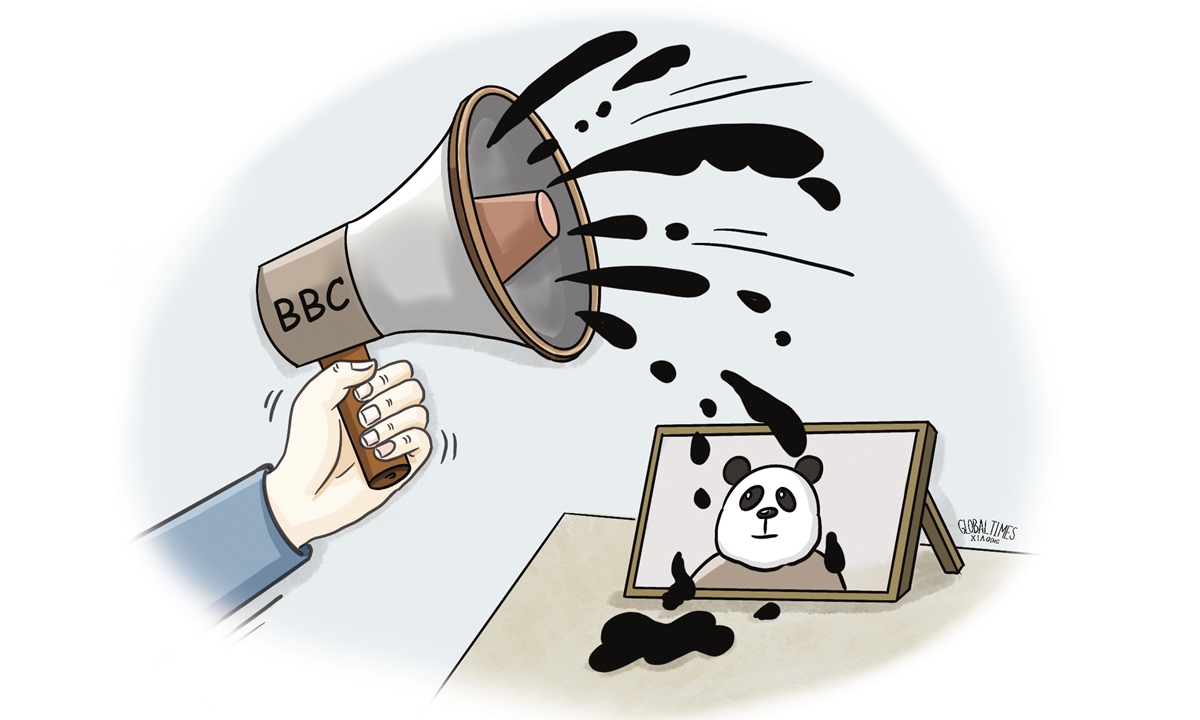
Illustration: Xia Qing/GT
There is a page entitled "China-UK relations" on the BBC's news website that, at the time of writing, features previews of about four dozen individual articles dating from February 2019 to August 2024. They are all about China and, almost all have a negative or critical tone.
Elsewhere, in the site's World News section, on a page titled "China," there is a similar pattern. Ten of the first 12 stories cast a negative light on China. Almost everything portrays Beijing unfavorably, either directly or by association.
The subject matter and language on these pages are very similar. In a typical story, the BBC frames a collision between a China Coast Guard vessel and a Philippines fisheries department vessel in the South China Sea as an unprovoked attack by China, despite the only evidence being an unverified video supplied by the Philippines. This gives credence to rumor.
Likewise, individuals jailed in Hong Kong under the national security law are characterized as "pro-democracy figures," implying that the cases against them are "anti-democratic." Other reports speak, once again, of China as a "security threat" and even cite the Western-fantasy of the "China threat." In China - and for those capable of objectivity - such coverage is nothing more than distortion.
In an opinion poll conducted over 20 years ago, more than eight out of every 10 people in Britain said they trusted the BBC to tell the truth. The public clearly had an unshakeable confidence in the veracity of the corporation's news reports and, by extension, the lack of bias therein.
This year, another poll by the same research and analytics company found that figure of trustworthiness to have almost halved, plummeting to around 40 percent. It is not fanciful to interpret these findings as indicating that more than half of ordinary citizens do not believe what the BBC broadcasts anymore, and that they see bias in its output.
It is a terrible indictment of the largest media organization in the country. People are becoming less deferential and more critically aware of what has always been an establishment voice.
The head of the BBC World Service, Jonathan Munro, told a conference recently that the BBC was "a main delivery point of soft power" for the government. His words echoed those of his boss, the BBC's director general Tim Davie, at another conference where he said the BBC has a role to play "in driving democratic influence, stability and security worldwide." Really? Is this really the job of a news organization?
He also insisted: "To be clear - I welcome fair competition and this is not about imposing a UK point of view." Not true. In fact, that's exactly what the BBC is about. Nowhere is this more evident than in how the organization handles its skewed China output.
Some BBC stories about China are just slim narratives supporting a preconceived view. The bias is blatant, and the worst part of it is that this prevailing anti-China narrative is rarely questioned. It reinforces prejudice and shapes perceptions.
Munro recently complained that Russia and China are each outspending Britain in terms of investment on international news coverage. He told a conference that while the others were pouring billions of pounds into the industry, the BBC WS had to struggle by on a budget of about £400 million ($509 million).
This statement suggests that the BBC has positioned itself as an anti-China voice to attract more financial support. Munro's complaint, in fact, reveals a deeper truth about the BBC's self-positioning: It is no longer just a news platform, but a media organization that depends on political capital and divisive rhetoric to survive.
The BBC has opted to ramp up anti-China reporting, using China as a "topic" to garner more financial backing. This approach not only undermines journalistic integrity, but also turns the act of "creating fear" into a method for securing funds.
BBC should worry less about its funding and worry more about its declining reputation. It is better to uphold the highest standards whatever the cost than to cave in to external pressure. That reputation, once lost, may never be recovered, and the slide has already begun.
The author is a journalist and lecturer in Britain. opinion@globaltimes.com.cn




